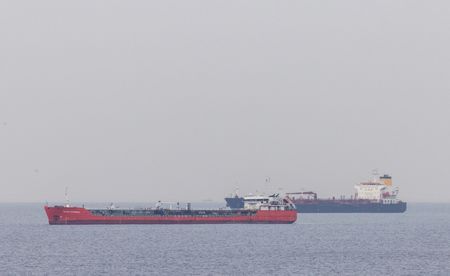By Daren Butler and Can Sezer
ISTANBUL (Reuters) -Turkey emerged as a critical stumbling block to a complex international plan to deprive Russia of wartime oil revenues as the number of tankers waiting to exit the Black Sea through Turkish straits continued to rise on Friday.
Ankara has declined to scrap a new insurance inspection rule it implemented at the beginning of the month despite days of pressure from Western officials.
A total of 28 oil tankers are in a queue seeking to leave the Bosporus and Dardanelles straits, the Tribeca shipping agency said on Friday.
G7 wealthy countries, the European Union and Australia agreed to bar providers of shipping services, such as insurers, from helping export Russian oil unless it is sold at an enforced low price, or cap, aimed at depriving Moscow of wartime revenue.
Turkey’s maritime authority said it would continue to keep out of its waters oil tankers that lacked appropriate insurance letters.
Western insurers said they could not provide the documents required by Turkey as it might expose them to sanctions if it emerged that the oil cargoes they covered were sold at prices that exceeded the cap.
The Turkish authority said that in the event of an accident involving a vessel in breach of sanctions it was possible the damage would not be covered by an international oil-spill fund.
“(It) is out of the question for us to take the risk that the insurance company will not meet its indemnification responsibility,” it said, adding that Turkey was continuing talks with other countries and insurance companies.
It added the vast majority of vessels waiting near the straits were EU vessels, with a large part of the oil destined for EU ports – a factor frustrating Ankara’s Western allies.
The Turkish authority said Turkey had plans for removing eight tankers that did not have P&I insurance waiting in the Marmara sea to cross the Dardanelles from its waters. These tankers would be escorted to cross the Dardanelles under additional measures after the strait is closed to maritime traffic, the statement said.
A shipping source said four of the tankers waiting to cross the Dardanelles were scheduled to go on Saturday with tug escorts.
One Turkish-flagged tanker got a P&I insurance letter from an international P&I group member insurance company after Turkey first asked for insurance letters from oil tankers, and that tanker crossed the Bosphorus on Friday, the statement said.
The ship backlog is creating growing unease in oil and tanker markets. Millions of barrels of oil per day move south from Russian ports through Turkey’s Bosphorus and Dardanelles straits into the Mediterranean.
KAZAKH OIL
Most of the tankers waiting at the Bosphorus are carrying Kazakh oil and Treasury Secretary Janet Yellen said on Thursday the U.S. administration saw no reason that such shipments should be subjected to Turkey’s new procedures.
Washington had no reason to believe Russia was involved in Turkey’s decision to block ship transits, she added.
The European Commission said on Friday the delays were unrelated to the price cap and Turkey could continue to verify insurance policies in “exactly the same way as before”.
“We are therefore in contact with the Turkish authorities to seek clarifications and are working to unblock the situation,” a spokesperson told Reuters.
Turkey has balanced its good relations with both Russia and Ukraine since Moscow invaded its neighbour in February. It played a key role in a United Nations-backed deal reached in July to free up grain exports from Ukrainian Black Sea ports.
Relations between NATO allies Ankara and Washington have at times been rocky, however, as Turkey last month renewed calls for the United States to stop backing Syrian Kurdish forces.
The Biden administration levied sanctions on Thursday on a prominent Turkish businessman Sitki Ayan and his network of firms, accusing him of acting as a facilitator for oil sales and money laundering on behalf of Iran’s Revolutionary Guards.
(Reporting by Daren Butler, Can Sezer, and Jonathan Saul in London; Additional reporting by Huseyin Hayatsever in Ankara, Writing by Noah BrowningEditing by Jonathan Spicer, Frances Kerry and Nick Macfie)





